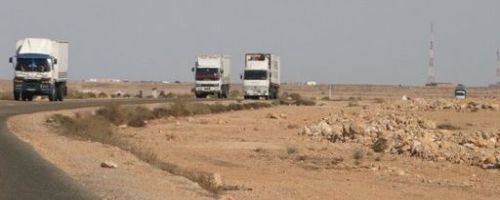
The construction of a Norwegian fishery plant planned for El Aaiun in Morocco-occupied Western Sahara was in 2005 stopped at the last minute. After intervention by the Norwegian Ministry of Foreign Affairs it was instead decided to place the plant in Morocco. But neither the exporter nor the importer can tell us anything about where the plant's raw materials derive from.
By Erik Hagen, Norwatch, 22.01.2007
A partly Norwegian-financed fishery project intended for Moroccan-occupied Western Sahara was during the summer of 2005 stopped before it got started. The project was to be a collaboration between the local fish-oil producer KB Fish and the Norwegian import firm GC Rieber. According to the plans - which were far advanced in the summer of 2005 - a refinery for fish-oil production was to be constructed in the Western Saharan city of El Aaiun, under Moroccan occupation.
After pressure from the Norwegian Ministry of Foreign Affairs, however, the investors decided to place the plant in the city Tan Tan, all the way to the south of Morocco, not far from the border to Western Sahara. Both the exporter and the import firm have confirmed this to Norwatch.
"Because of the negative publicity connected with El Aaiun, our planned investments were no longer of interest. On the basis of the discussions we had with the Norwegian embassy and Ministry of Foreign Affairs, the project was placed in Morocco rather than Western Sahara", Harald Wiedswang, the Norwegian manager of the Moroccan company KB Fish, told Norwatch on the phone from Agadir.
He could not guarantee that the production they have in Morocco obtains its raw materials from Morocco rather than from Western Sahara.
The Ministry of Foreign Affairs Intervenes
During the previous administration Norway's attitude with regard to Norwegian trade and commerce in the occupied region was considerably reduced.
“I don't recall exactly how the discussion went, but they made a definite recommendation that it should be placed in Morocco”, Wiedswang said about the conversation with the Norwegian authorities.
This is thus the second Norwegian fishery investment that has been withdrawn from Western Sahara, after the Norwegian Broadcasting Corporation's program ‘Brennpunkt’ in May 2005 exposed the Norwegian industry in the region. According to fishery magazine Fiskaren, the Norwegian ship-building factory Selfa Arctic stopped its projects in Western Sahara in the summer of 2005. Selfa Arctic had planned to construct small boats for Moroccan fishermen in the area but withdrew after pressure from the Ministry.
Can Not Guarantee
However, neither the exporter, Wiedswang, nor the importer, Arne Alnæs in GC Rieber, has a clear answer as to where the raw materials for the new refinery in Tan Tan originate from. El Aaiun is decidedly the most important harbour in the region for reception of fish from the rich fishing areas off the coast of Western Sahara. But much of what is brought to land in El Aaiun is transported north to Morocco for further processing. Most of it ends up in Tan Tan and Agadir, and the chances are therefore good that the Tan Tan plant utilizes fish waste from Western Sahara.

The photograph on the right was taken on the road between El Aaiun and Tan Tan in December 2006 and shows trucks with fish products driving shuttle service between the two cities. Tan Tan is located a 200-km drive from the Western Saharan border.
"Did you also discuss where the raw materials would derive from?", Norwatch asked.
“The embassy and the Ministry of Foreign Affairs have explained what they can and what they can not support. But what I do as a private citizen is quite a different thing”, Wiedswang told Norwatch
Nor could GC Rieber, the importer to Norway, comment on whether the raw materials are obtained from Western Sahara or Morocco but emphasized that they place great importance on following the Ministrys recommendations.
Critical
Sidi Omar dislikes strongly that the firms can not guarantee where the raw materials originate from. Omar is the London representative of the resistance movement Front Polisario.
“KB Fish should guarantee that the fish they process in Morocco does not stem from Western Sahara”, Omar said to Norwatch on the phone from England.
“But it is after all gratifying to learn that they have chosen to place their investment in Morocco. Every fish plant we can avoid having established in Western Sahara entails a handful fewer Moroccan settlers”.
NY Check new Western Sahara poster!
“Try to Visit Western Sahara”…
The Security Council fails Western Sahara and international law
On 31 October 2025, a new resolution was adopted in the UN Security Council calling on the Saharawis to negotiate a solution that would entail their incorporation into the occupying power, Morocco.
Saharawis Demonstrate Against Trump Proposal
The United States has proposed in a meeting of the UN Security Council on Thursday that the occupied Western Sahara be incorporated into Morocco.
Skretting Turkey misled about sustainability
Dutch-Norwegian fish feed giant admits using conflict fishmeal from occupied Western Sahara. Last month, it removed a fake sustainability claim from its website.



